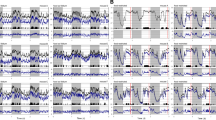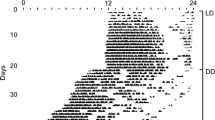Summary
Experiments were designed to test whether or not the 24-h core temperature fluctuations in week-old rat pups are of endogenous origin. Lean (Fa/-) Zucker rat pups born on the same day to mothers maintained in two different colonies with light/dark cycles 12 h out of phase with each other were mother-reared through the first 3–4 days of life and then artificially reared simultaneously in constant dim light. Continuous, automatic measurement of core temperature and oxygen consumption during artificial rearing showed clear 24-h rhythms in 5- to 8-day-old pups. Each rhythm reached a daily minimum at a time corresponding to the beginning of the light period in the colony of origin. The amplitude of these rhythms did not diminish during artificial rearing, nor did the phase difference between the rhythms of pups originating in the two colonies systematically change. The persistent 12-h phase differences between these two groups of pups prove that the observed rhythms are not caused by exogenous stimuli. We conclude that the rat pup possesses an endogenous time-keeping mechanism that permits the expression of overt rhythmicity at the age of 1 week.
Similar content being viewed by others
Abbreviations
- Tc :
-
core temperature
- LD-pups :
-
born to a mother entrained to a 7:00 to 19:00 light cycle, then artificially reared in constant dim light
- DL-pups :
-
born to a mother entrained to a 19:00 to 7:00 light cycle, then artificially reared in constant dim light
- SCN :
-
suprachiasmatic nucleus
References
Ader R, Grota LJ (1970) Rhythmicity in the maternal behavior ofRattus norvegicus. Anim Behav 18:144–150
Davis FC (1981) Ontogeny of circadian rhythms. In: Aschoff J (ed) Handbook of behavioral neurobiology. Volume 4: Biological rhythms. Plenum Press, New York, pp 257–274
Hall WG (1975) Weaning and growth of artificially reared rats. Science 190:1313–1315
Henning SJ, Gisel EA (1980) Nocturnal feeding behavior in the neonatal rat. Physiol Behav 25:603–605
Hiroshige T (1986) Maternal phase control of fetal circadian oscillation during pregnancy. Jpn J Physiol 36:238–251
Imai-Matsumura K (1988) Destruction of suprachiasmatic nucleus in newborn rats does not prevent endogenous circadian temperature rhythm in the second week of life. Pfluegers Arch [Suppl 1] 412:R97
Infurna RN (1981) Daily biorhythmicity influences homing behavior, psychopharmacological responsiveness, learning, and retention of suckling rats. J Comp Physiol Psychol 95:896–914
Kittrell EMW, Satinoff E (1986) Development of the circadian rhythm of body temperature in rats. Physiol Behav 38:99–104
Leon M (1986) Development of thermoregulation. In: Blass EM (ed) Handbook of behavioral neurobiology, vol 8. Plenum Press, New York, pp 297–322
Messer M, Thomas EB, Terrasa AG, Dallman PR (1969) Artificial feeding of infant rats by continuous gastric infusion. J Nutr 98:404–410
Mumm B, Kaul R, Heldmaier G, Schmidt I (in press) Endogenous control of circadian core temperature rhythm in weekold Wistar rats. J Interdiscipl Cycle Res
Nuesslein B, Kaul R, Schmidt I (in press) Absence of 24-hour core temperature cycle in rat pups arrificially reared under thermoneutral conditions. In: Thermal Physiology Symposium; Excerpta Medica International Congress Series. Elsevier, Amsterdam
Planche E, Joliff M (1987) Evolution des depenses energetiques chez le rat Zucker au cours de la premiere semaine de la vie. Effet de l'heure des mesures. Reprod Nutr Develop 27:673–679
Planche E, Joliff M, de Gasquet P, Leliepvre X (1983) Evidence of a defect in energy expenditure in 7-day-old Zucker rat (fa/fa). Am J Physiol 245:E107-E113
Reppert SM, Schwartz WJ (1983) Maternal coordination of the fetal biological clock in utero. Science 220:969–971
Reppert SM (1985) Metarnal entrainment of the developing circadian system. Ann NY Acad Sci 453:162–169
Schmidt I, Barone A, Carlisle HJ (1986) Diurnal cycle of core temperature in huddling, week-old rat pups. Physiol Behav 37:105–109
Schmidt I, Kaul R, Heldmaier G (1987) Thermoregulation and diurnal rhythms in 1-week-old rat pups. Can J Physiol Pharmacol 65:1355–1364
Schmidt I, Nuesslein B (1989) Developmental changes of circadian temperature rhythm in rats. In: Proc Internat Union Physiol Sci XVII, Helsinki p. 127
Smith GK, Anderson V (1984) Effects of maternal isolation on the development of activity rhythms in infant rats. Physiol Behav 33:751–756
Spiers DE (1988) Nocturnal shifts in the thermal and metabolic responses of the immature rat. J Appl Physiol 64:2119–2124
Withers PC (1977) Measurement of Vo2, Vco2, and evaporative water loss with a flow-through mask. J Appl Physiol 42:120–123
Author information
Authors and Affiliations
Rights and permissions
About this article
Cite this article
Mumm, B., Kaul, R., Heldmaier, G. et al. Endogenous 24-hour cycle of core temperature and oxygen consumption in week-old Zucker rat pups. J Comp Physiol B 159, 569–575 (1989). https://doi.org/10.1007/BF00694381
Accepted:
Issue Date:
DOI: https://doi.org/10.1007/BF00694381




